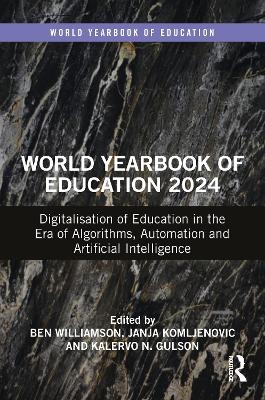
World Yearbook of Education 2024
Routledge (Verlag)
978-1-032-41790-5 (ISBN)
Providing a comprehensive, global overview of the digitalisation of education, the World Yearbook of Education 2024 examines the ways advanced digital technologies are transforming educational practices, institutions and policy processes.
Establishing a critical research agenda for analysing the digitalisation of education, the carefully selected chapters in this collection interrogate the current impacts of new digital technologies, emerging controversies over emerging data practices and future implications of algorithmic systems, automated decision-making and AI in education. Organised into four sections, the contributions in the collection examine the following:
The historical, scientific and technical foundations of contemporary digitalisation in education
The political and economic dynamics that underpin the education technology industry and new platform models of education
How algorithms, automation and AI support new modes of data-driven governance and control of education systems
Controversies over the inequitable effects of digitalisation in education, and proposals for data justice, ethics and regulation
This resource is ideal reading for researchers, students, educational practitioners and policy officials interested in understanding the future of digital technologies in education.
Ben Williamson is a senior lecturer at the Centre for Research in Digital Education, University of Edinburgh, UK. Janja Komljenovic is a senior lecturer and the director of the Centre for Higher Education Research and Evaluation at Lancaster University, UK. Kalervo N. Gulson is a professor in the Sydney School of Education and Social Work, University of Sydney, Australia.
1. Introduction: Digitalisation of education in the era of algorithms, automation and artificial intelligence Part I: Technoscience foundations 2. Theoretical foundations and historical roots of the ‘Automated Classroom’ 3. AI and lifelong learning: A genealogical approach to the analysis of educational imaginaries and problematisations 4. Natural language generation and the automation of pedagogical communication 5. Educational vanishing points: When interoperable platforms turn infrastructural and back in higher education Part II: Political economy 6. How platformisation affects pedagogical autonomy in primary schools 7. The relational powers of platforms and infrastructures played out in school: Differences and implications for teacher work 8. Assetisation of higher education’s digital disruption 9. AI shaped hole: Anticipation regimes and liminal policy rationalities 10. A political economy of AI and education in China Part III: Digital governance 11. Platforming PISA: The OECD as a mobile governance actor in global education 12. Digital literacies as a ‘soft power’ of educational governance 13. After digital literacy: Media pedagogies for platform ecologies 14. Social media’s education grab: Philanthrocapitalism, data centers, and the Metaverse vision of education Part IV: Design and justice 15. Algorithmic bias and discrimination through digitalisation in education: A socio-technical view 16. Digitalisation of education in the era of climate collapse and planetary breakdown 17. The EdTech Stack: A speculative design thought experiment 18. Design justice and educational technology: Designing in the fissures
| Erscheinungsdatum | 12.12.2023 |
|---|---|
| Reihe/Serie | World Yearbook of Education |
| Zusatzinfo | 6 Line drawings, black and white; 2 Halftones, black and white; 8 Illustrations, black and white |
| Verlagsort | London |
| Sprache | englisch |
| Maße | 156 x 234 mm |
| Gewicht | 1040 g |
| Themenwelt | Informatik ► Theorie / Studium ► Künstliche Intelligenz / Robotik |
| Sozialwissenschaften ► Pädagogik | |
| ISBN-10 | 1-032-41790-0 / 1032417900 |
| ISBN-13 | 978-1-032-41790-5 / 9781032417905 |
| Zustand | Neuware |
| Informationen gemäß Produktsicherheitsverordnung (GPSR) | |
| Haben Sie eine Frage zum Produkt? |
aus dem Bereich


